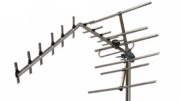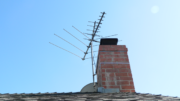It is absolutely true. Well, you have to understand the language, but the basic point is, you have the right to receive over-the-air television broadcasts if there are broadcasts in your area. That’s a lot of mumbo jumbo but let me explain.
You have the right to get the broadcasts in your area
First of all, you only have a right to get broadcasts that actually exist. You don’t have the right to demand that there is a station in your area. If your area doesn’t have an NBC station, you can’t take NBC to court to get one. On the other hand, if there is an NBC station, you have the right to put up an antenna and receive it.
You have the right to put up an antenna
Your right to put up an antenna isn’t unlimited, but you can put up anything you want on property you own, as long as it doesn’t interfere with established flight paths. You can use any indoor antenna you want, anywhere, and if you’re in an an apartment or if there’s a homeowner’s association, at the very least you have the right to put up an antenna of 39″x39″ or smaller in a private space like a patio, as long as you can do it without causing any damage. If your HOA or landlord is stopping you, leave us a comment below and we’ll get you the resources you need to help fight them.
You have a right to receive unencrypted programs
But really, the point here is that in the United States, TV and radio reception is free. Over-the-air broadcasters can’t encrypt or protect their programming, either. Why? Because in the US, the wireless spectrum (which is the set of radio frequencies used for broadcasting) is referred to as a “public trust.” This term means it’s something administered by the government for everyone’s fair use. Think about the national parks, or the interstate highways and you’ll be able to get an idea of what a public trust is.
Broadcasters have responsibilities
When a business wants to use a public trust, it has to agree to do so in a way to serve the public. Going back to the national parks idea, if McDonald’s wanted to build a restaurant in Yellowstone National Park, they would have to prove that it’s in the park-goer’s best interest. They’d have a pretty hard time proving that, I’d think. The same thing goes with broadcasting. Local broadcasters are given a license based on the idea that they’re going to use their chunk of that wireless spectrum to serve the public. They’re required to put on a certain amount of programming “in the public interest,” most of which ends up on Sunday mornings. And, in the case of broadcasting… the service must be free to anyone who can receive it. That’s the law.
Will things change in the future?
There’s no guarantee that we’ll always have free broadcasting in this country. There may not be any companies left that see the benefit of doing it in the future. If everyone skips commercials, there’s no revenue. Not that I’m crying big crocodile tears for broadcasters, but it’s a fact. At some point it could all go to the internet. We’ve certainly seen that over the last few year. The government could decide at some point that you have a right to free internet instead of free TV. Still, as long as there are people broadcasting out there, putting up an antenna and watching is absolutely your right.
By the way: People tend to ask, if broadcasting must be free and unencrypted, what about satellite TV? The rules that govern satellite TV are completely different in the US. Even though that may not make sense, it’s just true. The rules only govern local broadcasts in local areas.




